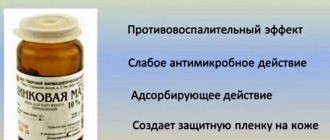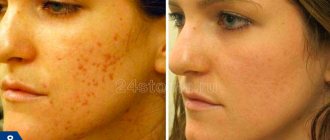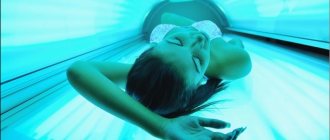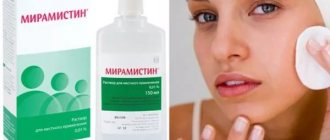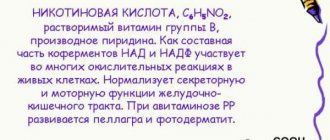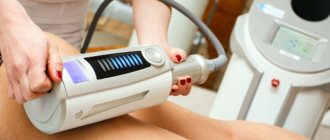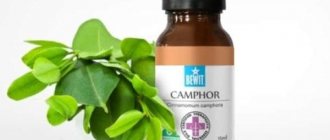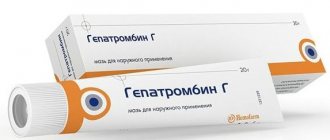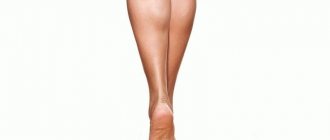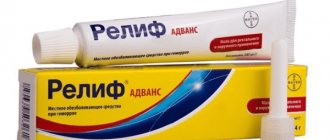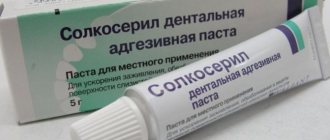Zinc ointment for acne on the face belongs to the category of inexpensive but quite effective drugs, judging by user comments, if acne is mild. Despite the fact that zinc oxide does not include acne on its list of indications, some user reviews call the drug nothing less than “effective.”
After reading the article, be sure to check out the ratings of acne lotions.
What is zinc ointment
Zinc ointment is a medicine for external use. It has a drying, adsorbing, disinfecting and astringent effect. Eliminates local inflammation and irritation. The ointment contains zinc oxide and petroleum jelly in a ratio of 1 to 10.
Zinc as an element is one of the main components of skin care cosmetics, which are intended for problematic and oily skin prone to the development of pimples, blackheads and inflammation. The effectiveness of the product has been scientifically proven, but this does not mean that the ointment can be used to treat any inflammation of the skin.
The drug should be stored in the refrigerator.
Price
Zinc ointment is sold at the pharmacy. Its cost is from 40 rubles per tube of 30 g. When purchasing, pay attention to the production date; it is prohibited to use a product that has expired.
How does the product work?
The active substance (zinc oxide) is excellent for treating skin diseases because this trace element is one of the natural constituents of the cells of the human body.
With the participation of zinc, many necessary enzymes are produced that help regulate the functions of the immune system, digestion and endocrine system. More than 20% of the total amount of Zn in the body is found on the skin.
Thus, zinc ointment is effective due to the following properties of its active substance:
- relief of inflammation;
- drying;
- disinfection;
- relieving irritation;
- acceleration of regeneration.
Indications for use
It is advisable to use zinc ointment in the following cases:
- presence of diaper rash;
- microtrauma of the dermis;
- trophic ulcers;
- minor burns;
- as part of complex therapy of herpes simplex and streptoderma;
- diaper dermatitis;
- Diaper rash.
The drug is prescribed for accelerated wound healing, after operations for hemorrhoids, and for traumatic balanoposthitis. It is also effective to use the ointment as a prophylactic against diaper dermatitis in babies. Used to treat excessive sweating and to treat wrinkles in obese people. The chickenpox rash is treated after using local antiseptics.
Beneficial features
Zinc ointment has the following properties:
- anti-inflammatory;
- restorative;
- astringent;
- weak lightening;
- decongestant;
- antiexudative;
- antimicrobial;
- drying.
The ointment regulates the activity of the sebaceous and sweat glands, which has a positive effect on the condition of problem skin.
The ointment has earned popularity in medicine due to its ability to stimulate local skin immunity and prevent malignant lesions of the dermis. In turn, cosmetologists note the effect of the ointment as an ultraviolet filter, which prevents early aging of the skin and the appearance of pigmentation on it.
Does zinc ointment help with acne?
The effectiveness of the product largely depends on what kind of acne you want to treat. Cosmetologists and dermatologists recommend using zinc ointment for acne, parasitic rashes and the presence of closed comedones. In the case of papular-pustular rashes on the dermis, it does not make sense to use ointment for the following reasons:
- Zinc ointment is not an antibiotic. The active component does not have antibacterial properties; for this reason, it is not able to neutralize microorganisms that cause suppuration.
- Impairs skin breathing. Zinc does not clog pores, but the Vaseline present in the ointment can do this.
- Does not penetrate deep layers of skin. Zinc salts have a superficial effect, which is why they are not able to stop the spread of the purulent-necrotic process.
In addition, according to the instructions for use, the ointment should not be used for infectious and inflammatory lesions. In such a case, the drug can spread the infection to nearby tissues, accelerating the appearance of pus, as well as increasing the size of the abscess. All this leads to the fact that after opening the abscess, the likelihood of a scar forming in its place increases.
For small rashes, the ointment is applied pointwise
It is permissible to use the ointment only for such purulent rashes, the contents of which have come out. For example, after using Vishnevsky ointment. After using zinc ointment, a treated and cleaned wound heals faster and stops oozing.
The medication can be used to treat tubercles that are almost inflamed. To understand whether the inflammatory process has begun, look at the pimples. If a red spot appears around a comedon or acne, then you can apply zinc ointment, which will stop the inflammation and help eliminate contamination of the duct.
If there is no pus, then the ointment works like this:
- normalizes the functioning of the sebaceous glands;
- relieves hyperkeratosis;
- prevents acne from becoming inflamed;
- softens the epidermis;
- gradually cleanses the skin;
- stabilizes skin functions, due to which acne gradually disappears.
The ointment is effective in the treatment of subcutaneous acne if there is no pus in it. In such a case, the ointment eliminates swelling, stabilizes the trophism of the dermis and the production of inflammatory mediators, and softens the skin. You should not apply zinc ointment to rashes if purulent contents are visible inside them. In this case, it is more advisable to use Vishnevsky or ichthyol ointments.
Using zinc ointment for acne spots does not give any result. The drug does not completely remove post-acne, does not whiten pigmentation and does not accelerate the resorption of scars. Yes, the ointment has a slight positive effect on acne marks, which is explained by stimulating the skin's regenerative processes. As a result of the use of medications and cosmetics, traces of the rash become less noticeable.
It should be noted that zinc ointment for the face against acne can only be used after a doctor’s prescription. You should not self-medicate, as this may worsen the situation.
Contraindications and side effects
Zinc ointment is often used for acne spots due to its whitening effect. Dermatologists warn that at the beginning of treatment, the color intensity of pigmented areas increases. This effect is reversible - the spots disappear after 7-10 days of regular use of the drug. In rare cases, itching and congestion of blood vessels in the inflamed areas may occur.
The external remedy is not prescribed to patients with infectious skin diseases.
It is not used for acne if you are hypersensitive to the ingredients. In this case, you cannot use all preparations with zinc: zinc paste, salicylic-zinc ointment.
How to use
The use of zinc ointment for acne has its own characteristics:
- Wash your hands with soap and then disinfect them using vodka or alcohol. This will help prevent infection from entering the inflamed skin.
- Do make-up removal if you plan to apply the ointment to your face, or take a swim if you plan to apply it to your butt or back.
- Apply the ointment in a thin layer to the acne affected area or dotted onto each pimple for small rashes. For spot application, it is convenient to use a match or a cotton swab.
- You can apply zinc ointment up to 6 times a day, but it is best to do no more than 3 times so that the skin can breathe.
- The ointment is almost not absorbed, so 30 minutes after application you should blot it with a paper towel.
An allergy test is an important condition for using zinc ointment. Apply a little onto your wrist. After 15-20 minutes, if there is no itching and redness, then you can use the drug.
Photos before and after using zinc ointment
This type of therapy is not suitable for working women, since after applying and removing the ointment, the skin must be allowed to breathe; decorative cosmetics should not be applied. Also, zinc ointment is not suitable as a base for makeup. Unemployed women do not have such problems; they can use the ointment until the problem disappears.
It is best to use the drug on weekends and at night, since at this time there is nowhere to rush and you can devote some time to self-care. Unfortunately, such rare use of ointment does not give a quick effect, so you should be patient.
The first results of use can be noticed 2-3 days after treatment. If the cosmetic problem is not resolved within a week, you should stop using the ointment and consult a doctor.
On the back and butt
Experts advise using zinc ointment for acne on the butt and back, as it has a pronounced effect: it quickly removes comedones without causing dry skin. In order to cope with acne in these areas of the body, you should steam the skin at least once every 5 days, and then apply healing ointment to it. If there are few rashes, then the product is applied pointwise using a cotton swab.
Apply the product to problem areas at least five times a day. The ointment is poorly absorbed, so a quarter of an hour after application it should be blotted with a paper napkin. After using the ointment, you should not wear clothes, as the product leaves stains on them.
During pregnancy
During pregnancy and lactation, zinc ointment should be used with caution and only after permission from a doctor. Despite the fact that it can be used even in babies, hormonal levels change during pregnancy, which can cause an allergic reaction.
Opinion against
Zinc ointment for acne, the use of which in dermatology is disputed, is not used as a monotherapy. This is explained by its low activity against bacteria that have penetrated the ducts of the sebaceous glands and caused acne and inflammation. Nevertheless, zinc is included in suspensions, mash and pastes, where, along with other active substances, it shows the best results.
To understand whether Zinc ointment helps with acne, you should remember the reasons for their appearance, namely:
- excessive sebum secretion;
- hyperkeratosis (thickening and proliferation of cells in the inner layer of the ducts of the sebaceous glands and hair follicles);
- acne bacteria;
- inflammation.
For acne to appear, all 4 factors must work. Sebum mixes with dead cells and forms a viscous mass that clogs the ducts of the sebaceous glands like a plug. Such an environment becomes very attractive for acne bacteria, which rush into these areas and, as a result of the body’s reaction to their vital activity, inflammation occurs - acne appears.
Hair follicles, where the ducts of the sebaceous glands exit, lie at an average depth of 2-4 mm. Zinc oxide is insoluble in water, which means it cannot decompose into ions that can penetrate deep into the skin, enter the area of inflammation and somehow affect hypersecretion and hyperkeratosis. This can only be done by zinc compounds based on hyaluronate, acetate dihydrate and sulfate, which are dissolved in various solvents. These compounds are included in such drugs as Curiosin, Klin AK and Zinerit, which have proven themselves quite well against acne.
If large areas of skin are affected by acne, all of them should be covered with the drug. In this case, zinc ointment for acne can have a completely opposite effect. Zinc dries, but the sebaceous glands perceive excessive dryness as a danger to the skin and begin to produce even more secretion to moisturize it, which provokes a worsening of the situation.
READ ALSO: Rashes in the form of blisters: causes, symptoms | Food and Health
The product also does not have a detrimental effect on bacteria - one of the main links in the appearance of acne. It creates unfavorable living conditions for them on the surface of the skin, but cannot affect the living conditions in the formed comedones (plugs).
Mask with zinc ointment
You can use the medicinal ointment either in its pure form or by making homemade masks with additional products based on it. Below is a recipe for preparing a cosmetic product for acne and blackheads.
Ingredients:
- vitamin A (in ampoule) - 5 drops;
- salicylic ointment 10% - 5 tsp;
- sulfur ointment 33% - 5 tsp;
- birch tar - 7 drops;
- ether of tea tree, rosemary, juniper and bergamot - 2 drops each;
- zinc ointment - 1 tbsp.
How to prepare: Combine all ingredients, stir until smooth. Transfer the finished mixture into an empty and clean cream jar, then put it in the refrigerator.
How to use: Apply the cream to problem areas of the skin at night.
Proper nutrition is the key to healthy skin
Product based on clay and zinc ointment
The benefits of the ointment increase if you use cosmetic clay. Your skin type will tell you which clay to use. If oily - black and pink, if combined - green.
Initially, the clay should be mixed with water to remove all lumps, then add zinc ointment. All ingredients are added in the amount of one teaspoon. Then quickly apply a thick layer to the skin for about fifteen minutes. Then rinse off with warm water; it is recommended to use a moisturizer after the procedure.
Action: pores are cleansed, skin color is evened out, secretion production from the sebaceous glands is normalized.
Prevention
How to consolidate the results obtained and reduce the likelihood of acne recurrence? Follow these tips:
- Use the ointment daily - only in this case the effect will be noticeable.
- During and after therapy, eat properly, do not indulge in fatty, fried, smoked and flour products. Include foods that contain zinc in your diet (beans, legumes, nuts, liver).
- When using zinc ointment, it is advisable to refrain from using other medications for acne, as this may cause the development of various side effects or minimize the healing effect of the ointment.
How to take zinc tablets for acne
It is impossible to compensate for the lack of zinc in the body with food, so tablets are prescribed for acne, dandruff and hair loss. Zincteral is most often prescribed. The drug is taken either before meals (an hour), or after it - after 2 hours. For gastrointestinal diseases, Zincteral can be taken with food.
You should not prescribe medications to yourself. Only the doctor, after examination and tests, will help you choose the necessary course of treatment!
The daily dose is 1-2 tablets. It can be changed by the doctor, but depends on the patient’s condition and the success of drug therapy. Long-term intake (from 6 to 8 weeks) of vitamins with zinc (in particular, vitamin A) is recommended, since these substances are considered essential for the treatment of all skin diseases. However, the dosage of drugs should be determined by a doctor.
Contraindications
It is not advisable to use the ointment if there are microtraumas and wounds on the skin, especially if they are located near the eyes and eyelids. You should also refrain from using it in case of acute purulent-inflammatory processes and in case of individual intolerance. An overdose of the drug is impossible.
In some cases, after use, side effects are possible, which manifest themselves as:
- itching;
- cracks;
- peeling;
- excessive dryness of the dermis;
- redness in the area of application.
If a patient is allergic to substances in the ointment, it is expressed as:
- redness of the dermis;
- burning sensations;
- small rash;
- itching;
- hives.
If these signs are detected, it is recommended to discontinue the ointment.
Reviews
Below are reviews from a cosmetologist, dermatologist and women about zinc ointment for acne.
Irina, therapist
Zinc ointment is a good anti-inflammatory agent that can be used for acne all over the body, including the back and butt. It is quite rare to cause side effects, but it is advisable to consult your doctor before use.
Valentina, cosmetologist
Zinc acne ointment is an effective remedy that must be used correctly to get the desired result. Before use, you should consult your doctor and make sure you are not allergic to the drug. It is not recommended to use the ointment on a regular basis, as it prevents the skin from breathing.
Mikhail, dermatologist
Zinc ointment is not a solution to skin rashes. First, you should know the tests to make sure there are no hidden diseases. And only after that apply the ointment.
Natalya, 36 years old
This is the second year I have been using zinc ointment for acne. I like the ease of applying the ointment and the inexpensive price. The first results are visible already after 2 weeks of using the product.
Inga, 21 years old
I used zinc ointment for acne on my forehead. It caused a severe allergy in me, and now I am looking for another remedy for rashes.
Vika, 18 years old
I used zinc ointment for subcutaneous acne. The first result was noticeable on the 3rd day of treatment. The acne went away completely in 2 weeks.
To obtain a positive result, you should use zinc ointment regularly. If there are no visible results after 2 weeks of use, look for another acne remedy.
Flaws
A zinc-based preparation is 90% petroleum jelly, so when using zinc ointment for acne, you need to be prepared for the fact that it will cover the skin with a thick, airtight film. This white, greasy layer is extremely difficult to wash off with water.
The drug is also resistant to gels and facial washes. In this case, you can use tar soap, which will not only wash away the product, but will also produce an additional therapeutic effect.
A significant disadvantage of this dosage form is the prohibition on the use of cosmetics during treatment. Women and girls often cannot refuse foundation. In this case this is excluded. You can only use the medication while at home.
READ ALSO: Rash on the neck in an adult: causes, possible diseases, treatment methods, reviews
Before using a zinc-based product, you should decide on your skin type. The drug is not suitable for those with dry epidermis, as it dries out the skin greatly.
